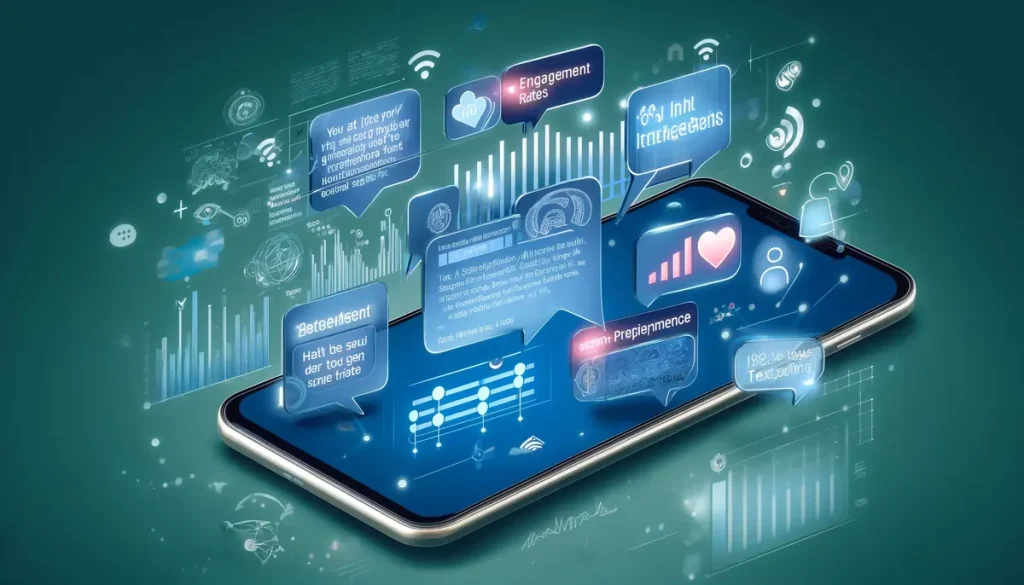In the digital world, 90% of consumers prefer texting as a primary form of communication, with a significant shift towards this medium seen particularly among tech-savvy Gen Z entering the market. Studies show that text messages have an astonishing open rate of 98%, far surpassing email and voice channels. This change is not just a passing trend but a fundamental shift in how businesses must interact with their customers. While voice and email remain essential for outbound sales and customer support teams, the increasing preference for texting cannot be ignored.
Advances in AI technology have enabled businesses to meet these new demands efficiently without overwhelming their agents. AI text messaging is a revolutionary tool that allows companies to communicate effectively and seamlessly with their customers. This guide explores the benefits of AI text messaging, its integration with CRM systems, and how to maintain compliance while using this technology.
Read More: How To Use Voice Cloning AI To Replicate Your Voice
Understanding AI Text Messaging
AI text messaging, or SMS AI, refers to SMS solutions that leverage conversational AI technology to interact with customers and leads via text. These AI models are trained on extensive amounts of text and speech data, enabling them to understand, process, and generate human language. Over time, as these systems receive more training, they become adept at handling complex situations and providing meaningful responses.
AI text messaging solutions, like those offered by Voso.ai, are capable of engaging in two-way text conversations. This technology can deliver significant sales and marketing value across various industries, from lead generation contact centers to political campaigns. The ability to conduct meaningful interactions over text opens up new avenues for businesses to connect with their audience in a personalized manner.
The Benefits of AI-Driven SMS in Customer Service and Sales
Text messaging offers unparalleled engagement rates, with studies showing open rates as high as 98%. This is significantly higher than other communication channels like email and voice. Furthermore, approximately one-third of SMS recipients engage with the message’s call-to-action (CTA), and nearly half of these users proceed to make a purchase. These statistics highlight the potential of SMS marketing to drive sales and customer engagement.
Not only does SMS drive sales, but it also serves as an excellent support channel. A majority of consumers express a preference for text-based customer service for tasks such as appointment reminders and customer service inquiries. By leveraging AI-driven SMS, businesses can meet these preferences efficiently.
- High Engagement Rates: Text messages have significantly higher open rates compared to email and voice channels.
- Increased Sales: Engaged recipients often follow through with the CTA, leading to higher conversion rates.
- Effective Customer Support: Many consumers prefer text-based interactions for customer service needs.
Practical Applications of AI Text Messaging
One of the most practical applications of AI text messaging is in appointment setting. Imagine a consumer who prefers texting over calling for help. They submit a form to learn more about a service and receive a thank-you message via text. This message includes questions about their availability, leading to a text conversation that schedules an appointment with a sales agent. The consumer may not even realize they are interacting with AI, as the process feels seamless and efficient.
AI text messaging solutions, or text-enabled Intelligent Virtual Agents (IVAs), can handle the scheduling process, freeing up human agents to focus on the actual sales or service appointments. This not only improves efficiency but also enhances the customer experience.
AI-driven SMS is also capable of managing two-way support and sales conversations. By analyzing customer history and sentiment, AI can deliver personalized replies and recommendations. This ensures that customers receive relevant information and solutions, fostering a positive relationship with the brand.
Integrating AI Text Messaging into an Omnichannel Strategy
An omnichannel strategy is essential for delivering a cohesive customer experience. While text messaging is preferred by some segments, such as Gen Z and millennials, it should be part of a broader communication strategy that includes various channels. Text messaging can complement other outreach methods, enhancing overall campaign effectiveness.
Automation plays a crucial role in this integration. AI text messaging can be incorporated into automated workflows, ensuring that texts are sent at optimal times as part of a well-planned outreach cadence. This synchronization with other channels, such as email and voice calls, amplifies the impact of each communication touchpoint.
- Multichannel Approach: Combine text messaging with other communication channels for a holistic strategy.
- Automation: Use automated workflows to time text messages perfectly within the outreach plan.
- Increased Engagement: Multichannel campaigns are more effective than single-channel efforts.
Ensuring Compliance in AI Text Messaging
While AI text messaging offers numerous benefits, it is crucial to adhere to compliance regulations to avoid penalties and ensure successful message delivery. Businesses must follow both state and federal guidelines when sending text messages. Violating these rules can lead to significant consequences, including fines and blocked messages.
To ensure compliance:
- Obtain express written consent from leads before texting them.
- Include a clear opt-out option in every message.
- Communicate terms and conditions transparently.
- Respect state-specific time restrictions for messaging.
These best practices help businesses maintain TCPA-compliant messaging. For more detailed guidance, refer to resources like Contact Center Compliance, and consult legal counsel to stay updated on regulatory changes.
Conclusion
AI text messaging is transforming customer communication, offering businesses a powerful tool to engage with customers effectively. By understanding its benefits and applications, integrating it into an omnichannel strategy, and ensuring compliance, businesses can leverage AI-driven SMS to enhance their sales and support operations.

